#us youth poet laureate
Explore tagged Tumblr posts
Text
Author Han Kang won this year’s Nobel Prize in literature, becoming the first Asian woman to do so and the second Nobel laureate from South Korea. A woman being the first Korean author to win the prize is a breath of fresh air, especially as the poet Ko Un, long considered the most likely South Korean to win the prize, was exposed as a serial sexual harasser in 2018 by South Korea’s own Me Too movement.
Han’s win is also a triumph of South Korea’s fierce and resilient democracy. South Korea’s first Nobel laureate was Kim Dae-jung, an activist-turned-president who won the peace prize in 2000 for his efforts to restore democracy in the country and improve relations with North Korea. Han’s win echoes Kim’s path. Although Han initially gained international fame through her 2007 novel The Vegetarian, which won the 2016 International Booker Prize, her profile reached new heights with subsequent novels that delved into South Korea’s tortuous modern history: Human Acts was about the 1980 Gwangju Uprising, where hundreds of protesters were murdered by the dictatorship, and We Do Not Part was about the Jeju Massacre of the late 1940s by then-President Syngman Rhee, South Korea’s first autocrat.
Han’s Nobel Prize is a nod of recognition for the South Korean people’s struggle for freedom and democracy against the dictatorship that ruled the country for nearly five decades and still casts a shadow on Korean politics to this day.
Both Kim and Han are from South Joella province, the region that suffered the most under South Korea’s military dictators. Both gained renown through their connection to the 1980 Gwangju Uprising—Kim as a leader of the democracy movement that called attention to the massacre, and Han as the author of Human Acts, which examines the massacre from various perspectives, including an amateur mortician cleaning the bodies of the dead, a censored author, a survivor with post-traumatic stress disorder, and the dead themselves.
Han is part of a transformative generation of both political heroism and artistic talent. Han enrolled in Yonsei University in 1989, just two years after the death of Yonsei student activist Lee Han-yeol—the event that led to the fall of the Chun Doo-hwan dictatorship and South Korea’s transition to democracy. One year ahead of Han at Yonsei was Bong Joon-ho, a student activist who would go on to become an Oscar-winning director with movies such as Parasite and Snowpiercer, both sharp criticisms of capitalism. One year after Han at Seoul National University across town was Hwang Dong-hyuk, who would later win an Emmy Award as the director of Squid Game, a global hit TV series that also highlighted inequality in South Korea.
Though working in different mediums, Han, Bong, and Hwang were all forged in the crucible of South Korea’s tumultuous 1980s and ’90s. In those two decades, the country saw a brutal massacre and an authoritarian government that reveled in witch-hunting communists and the use of torture. Then the dictatorship fell, leading to electoral democracy, the Olympics, and a flowering of youth culture that sowed the seeds for the global popularity of K-pop and Korean dramas. But greater wealth and freedom soon gave way to hyper-competitive capitalism, inequality, and new uncertainties, causing some to pine for the simpler days of the past.
The works of South Korea’s democracy generation are resonating globally because, in the rhymes of history, today’s world resembles the South Korea that Han, Bong, and Hwang saw in their formative years. War and mass murder rage on, with their horrors felt more intimately than ever. Liberal democracy is barely holding on, with the masses willingly submitting to clownish authoritarianism. The world might be wealthier than before, but the small improvement in material conditions is cold comfort to those who lose out in the economic rat race. By looking back on their experiences, Han, Bong, and Hwang created works of art that ask painfully relevant questions for today’s world.
Han’s relentless focus on the violation of bodily integrity is what sets her apart from her predecessors and peers. Other giants of South Korean literature also dealt with the country’s tumultuous modern history, with authors like Jo Jeong-rae and Park Kyong-ni producing epic novels that vividly recount the decades of colonialism, war, and dictatorship. But Han distinguishes herself by drawing the connection of those decades to the effect on one’s body—something extremely personal.
The protagonist for The Vegetarian, for example, is an ordinary woman named Young-hye who suddenly finds meat disgusting, repelled by the implied violence in the food. In the face of subtle and overt violence committed by her husband’s family who cannot understand her decision, she slowly transforms herself into a tree. The Vegetarian gained popularity in South Korea with the rise of toxic misogyny among young men that fueled South Korean politics’ rightward turn—a trend that is now emerging in many parts of the world.
Han’s subsequent works widen the circle of violence from patriarchy to state violence, but her focus on bodily integrity remains the same. Human Acts opens with a stark image of massacred bodies piled on like meat at a butcher shop and one of the protagonists desperately trying to hold back the intestines from spilling out of them. The image is brutal, but not gratuitous—it is an image that must be confronted as reality, just like the horrific images of destruction in Ukraine or dead children in Gaza.
Softly but meticulously, Han’s works examine how social structures—as intimate as an oppressive family, or as distant as the dictatorship government across the sea—can cause such raw and exquisite pain. In doing so, Han asks the thorny but necessary questions for today. What must be done about all this pain? How can the world remain so cold and unmoved in the sight of such suffering? Having seen such suffering, how do we live with ourselves while maintaining human dignity, without drowning in self-hate and survivors’ guilt? Through masterful presentation of these questions, Han elevated the challenges that South Korea’s democracy generation has confronted for decades to issues for the whole world.
14 notes
·
View notes
Text
winter time listens
hoo boy howdy it's another post where i tell you what tunes are running little circles around the race track between my ears!!
• twen - Seastar. new track by twen alert!!!!! Listen. come closer. here down on one knee, yes just like that. now im whispering in your ear, whoa thats a lotta wax haha im just kidding. LISTEN. i am a twen head. i am deep behind twenemy lines. twen is a reverb heavy psych rock indie pop DIY band I am obsessed with. you've got funky grooves, guitar solos, sing-along-able lyrics, and aint that just the best. my favorite songs by them are Long Throat and Bore U
• kara jackson - Why Does The Earth Give Us People To Love? - FORMER YOUTH POET LAUREATE KARA JACKSON!!! released an album and it is a delight. the lyrics the voice the instrumentation is all *chefs kiss*. deceptively simple elements coming together to make something so special - really transporting, emotional and melodic. great for ruminating on your life or your own original ideas. OVER. EAR. HEADPHONES. REQUIRED.
• Holiday Sounds of Josh Rouse - josh rouse is a lovely (tbh i know nothing about the man besides his music so he could potentially not be lovely i dont know this person at all but BASED ON MY LIMITED KNOWLEDGE of his delightful music he seems nice) man who makes brazilian/bossa inspired music. I really love his holiday album that contains some christmas stuff and some more generalized holiday music. It's all ORIGINAL holiday songs which can be hard to pull off but i think you will find at least one new classic on here to listen to every year in the winter time. my favorites are Mediterranean X-Mas and Easy Man :)
34 notes
·
View notes
Text
The Great Blue Heron of Dunbar Road
By Ada Limón, current Poet Laureate of the United States (1976- ), Published 2015
That we might walk out into the woods together, and afterwards make toast in our sock feet, still damp from the fern’s wet grasp, the spiky needles stuck to our legs, that’s all I wanted, the dog in the mix, jam sometimes, but not always. But somehow, I’ve stopped praising you. How the valley when you first see it—the small roads back to your youth—is so painfully pretty at first, then, after a month of black coffee, it’s just another place your bullish brain exists, bothered by itself and how hurtful human life can be. Isn’t that how it is? You wake up some days full of crow and shine, and then someone has put engine coolant in the medicine on another continent and not even crying helps cure the idea of purposeful poison. What kind of woman am I? What kind of man? I’m thinking of the way my stepdad got sober, how he never told us, just stopped drinking and sat for a long time in the low folding chair on the Bermuda grass reading and sometimes soaking up the sun like he was the story’s only subject. When he drove me to school, we decided it would be a good day, if we saw the blue heron in the algae-covered pond next to the road, so that if we didn’t see it, I’d be upset. Then, he began to lie. To tell me he’d seen it when he hadn’t, or to suppose that it had just taken off when we rounded the corner in the gray car that somehow still ran, and I would lie, too, for him. I’d say I saw it. Heard the whoosh of wings over us. That’s the real truth. What we told each other to help us through the day: the great blue heron was there, even when the pond dried up, or froze over; it was there because it had to be. Just now, I felt like I wanted to be alone for a long time, in a folding chair on the lawn with all my private agonies, but then I saw you and the way you’re hunching over your work like a puzzle, and I think even if I fail at everything, I still want to point out the heron like I was taught, still want to slow the car down to see the thing that makes it all better, the invisible gift, what we see when we stare long enough into nothing.
5 notes
·
View notes
Text
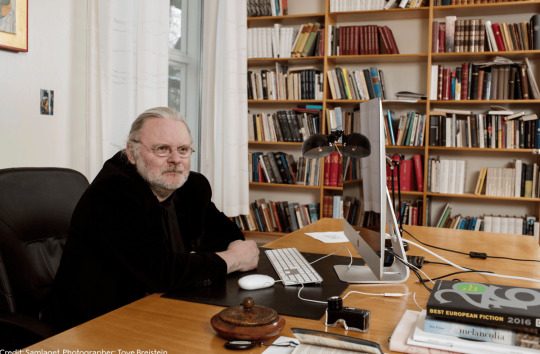
Having long been tipped as the next Nobel laureate, the Norwegian writer has this year been awarded the prize. For those new to the acclaimed playwright and novelist, here are some good ways in.
The novelist, playwright, essayist and poet Jon Fosse, 64, is this year’s winner of the Nobel prize in Literature. He is now set to become the world’s best-known Norwegian writer of contemporary fiction, perhaps even overtaking his former student, Karl Ove Knausgård. In his career as a playwright, Fosse has been hailed as “the new Ibsen” – borne out by the fact that his plays are the most widely performed in Norway after Ibsen’s own. Despite years of international acclaim, however, it is only relatively recently that Fosse’s books have begun to reach the mainstream of English translation publishing – so here’s where to begin.
The entry point
Fosse’s powerful (and frequently very short) stories in the collection Scenes from a Childhood span Fosse’s literary career from 1983 to 2013. They serve as an introduction to the central themes of his work – childhood, memory, family, faith – coupled with a strong sense of duality and of fatalism. Fragmentary, elliptical, at times deliberately simplistic, they mark life’s journey from extreme youth to old age. Standouts include Red Kiss Mark of a Letter, And Then My Dog Will Come Back to Me.
If you only read one
In Fosse’s 2023 novella Aliss at the Fire, an old woman, Signe, lies by the fire at her house next to a fjord, dreaming of herself 20 years earlier and her husband, Asle, who rowed out one day on the water in a storm and never came back. It is typical of Fosse – bleak, with a grand use of a repeated central image, that of blackness, and structured around the grip of ancestral history (the Aliss of the title is Asle’s great-great-great-grandmother), doubles and repeated actions: Asle’s grandfather had the same name as him and met the same fate by drowning. Hypnotic and mysterious.
If you’re in a rush
Published in 1989, The Boathouse is the closest thing Fosse has written to a crime novel. The 30-year-old narrator seems to have failed at everything in life – he lives with his mother, is a virtual recluse, doesn’t seem able to do basic things for himself. His most important achievement lies in his past – the rock band he had with his childhood friend Knut, with whom he has lost contact. Yet one summer a chance encounter with Knut, now married and relatively successful, will lead to a devastating denouement. Parallel to this, the narrator is also writing a novel that is an acute observation of every instance of his “restless” existence: a perfect example of the “write, don’t think” maxim as Fosse instructed his students in the late 80s in Bergen, when this book was in the making.
The play
“I can’t help wondering if the cultural gulf between Fosse’s world and our own is too wide,” wrote the Guardian critic when his 1999 play Dream of Autumn had its English language premiere in Dublin in 2006. Much has changed in Europe and the rest of the world in the intervening 17 years, however. The drama’s premise is simple, the undercurrents are not: a man and a woman meet in a graveyard and begin an affair – perhaps they knew one another in a past life. As they leave the graveyard the man’s parents arrive for a funeral and, as is common with Fosse, time leaps forward by years, in a lingering, longing dance of intergenerational circularity.
The one worth persevering with
In Melancholy I and II, Fosse takes us deep into the tortured mind of the 19th-century landscape artist Lars Hertervig, who died impoverished in 1902 in his early 70s, and whose life was blighted by the hallucinations and delusions that made his paintings appear so dreamlike, so sublime. Hertervig first became psychotic as a student at art school in Düsseldorf and, as well as an often terrifying examination of mental illness, the novels (originally published separately but now as one volume) are most significantly about what it means to be an artist. Melancholy I details the young Hertervig’s obsessions, anxieties, and eventual breakdown during one terrible day; Melancholy II acts as a coda, with different narrative perspectives – including that of a would-be fictional biographer – many years after Hertervig’s death.
The masterpiece
The seven books of Fosse’s Septology I-VII (helpfully compressed into three volumes comprising The Other Name, I Is Another and A New Name) centre on Asle, an ageing artist living in remote south-west Norway. A Catholic convert, like Fosse himself, Asle is grappling with time, art and identity. It is an extraordinary work of existential crisis, of memory loss, and persistent doppelgangers, either real or imaginary – the life lived, and the life that might have been lived, in the person of the shadowy other. It’s a frightening and intense read, which is rendered without a sentence break, so that the reader is essentially living Asle’s life with him. Septology is also a work of deep religious faith in which a man, an artist, and a human being, above all, in the end comes full circle: “It’s definitely true that it’s just when things are darkest, blackest, that you see the light.”
Daily inspiration. Discover more photos at Just for Books…?
13 notes
·
View notes
Text
Today for Women History Month we honor the birthdays of two women in the arts, Janet Collins and Amanda Gorman
Janet Collins (March 7, 1917 – May 28, 2003) was an African American ballet dancer, choreographer, and teacher. She performed on Broadway, in films, and appeared frequently on television.[1] She was among the pioneers of black ballet dancing, one of the few classically trained Black dancers of her generation.
Janet Faye[2] Collins was born in New Orleans, and at the age of four moved with her family to Los Angeles, California, where Collins received her first dance training at a Catholic community center. She studied primarily with Carmelita Maracci, Lester Horton, and Adolph Bolm, who were among the few ballet teachers who accepted black students. She also had fond memories of studying with Los Angeles dance teacher Dorothy Lyndall.
Amanda S. C. Gorman[1] (born March 7, 1998)[2] is an American poet and activist. Her work focuses on issues of oppression, feminism, race, and marginalization, as well as the African diaspora. Gorman was the first person to be named National Youth Poet Laureate. She published the poetry book The One for Whom Food Is Not Enough in 2015. In 2021, she delivered her poem "The Hill We Climb" at the inauguration of U.S. President Joe Biden.
Her inauguration poem generated international acclaim, and shortly thereafter, two of her books achieved best-seller status, and she obtained a professional management contract. In February 2021, Gorman was highlighted in Time magazine's 100 Next list under the category of "Phenoms", with a profile written by Lin-Manuel Miranda.[3] That same month, Gorman became the first poet to perform at the Super Bowl, when she delivered her poem "Chorus of the Captains" at Super Bowl LV.
Born in Los Angeles, California,[5][6] Gorman was raised by her single mother, Joan Wicks, a 6th-grade English teacher in Watts,[7] with her two siblings.[5][8] Her twin sister, Gabrielle, is an activist[9] and filmmaker.[10]Gorman has said she grew up in an environment with limited television access.[11] She has described her young self as a "weird child" who enjoyed reading and writing and was encouraged by her mother.[5]
Gorman has an auditory processing disorder and is hypersensitive to sound.[5] She also had a speech impediment during childhood.[12][13]Gorman participated in speech therapy during her childhood and Elida Kocharian of The Harvard Crimson wrote in 2018, "Gorman doesn't view her speech impediment as a crutch—rather, she sees it as a gift and a strength."[14] Gorman told The Harvard Gazette in 2018, "I always saw it as a strength because since I was experiencing these obstacles in terms of my auditory and vocal skills, I became really good at reading and writing. I realized that at a young age when I was reciting the Marianne Deborah Williamson quote that 'Our deepest fear is not that we are inadequate, our deepest fear is that we are powerful beyond measure' to my mom."[1] In 2021, Gorman told CBS This Morning co-host Anthony Mason that she used songs as a form of speech therapy, and explained, "My favorite thing to practice was the song 'Aaron Burr, Sir,' from Hamilton because it is jam-packed with R's. And I said, 'if I can keep up with Leslie in this track, then I am on my way to being able to say this R in a poem."
#Women’s History Month#Janey Collins#March 7#women in the arts#African American women in ballet#Amanda Gorman#African American women poets#The Hill We Climb#Best selling books by women#Call Us What We Carry
12 notes
·
View notes
Text
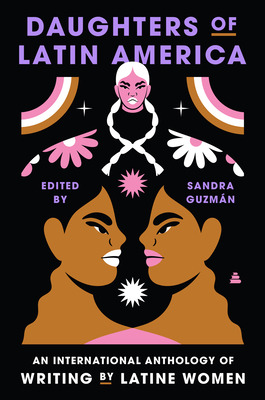
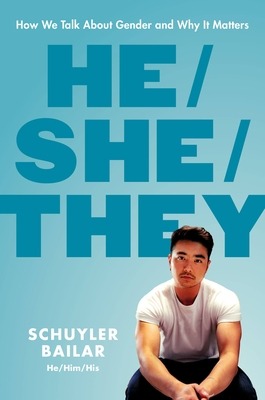
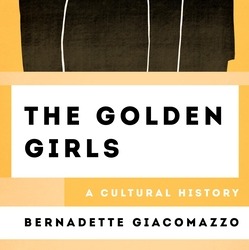
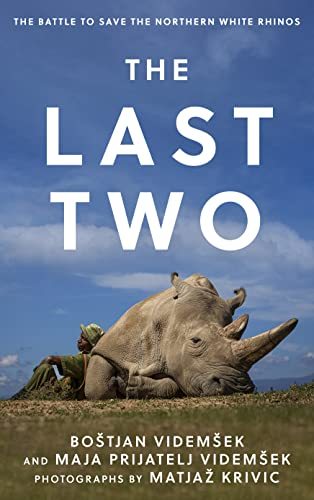
Nonfiction Thursday: New Book Picks
Daughters of Latin America edited by Sandra Guzmán
Daughters of Latin America collects the intergenerational voices of Latine women across time and space, capturing the power, strength, and creativity of these visionary writers, leaders, scholars, and activists—including 24 Indigenous voices. Several authors featured are translated into English for the first time. Grammy, National Book Award, Cervantes, and Pulitzer Prize winners as well as a Nobel Laureate and the next generation of literary voices are among the stars of this essential collection, women whose work inspires and transforms us.
An eclectic and inclusive time capsule spanning centuries, genres, and geographical and linguistic diversity, Daughters of Latin America is divided into 13 parts representing the 13 Mayan Moons, each cycle honoring a different theme. Within its pages are poems from U.S. Poet Laureate Ada Limón and celebrated Cervantes Prize–winner Dulce María Loynaz; lyric essays from New York Times bestselling author Naima Coster, Pulitzer prize-winning playwright Quiara Alegría Hudes, and Guggenheim Fellow Maryse Condé; rousing speeches from U.S. Representative Alexandra Ocasio-Cortez, and Lencan Indigenous land and water protector Berta Caceres; and a transcendent Mazatec chant from shaman and poet María Sabina testifying to the power of language as a cure, which opens the book.
He/She/They by Schuyler Bailar
Go‑to expert on gender identity, Schuyler Bailar, offers an essential, urgent guide that changes the conversation. Anti-transgender legislation is being introduced in state governments around the United States in record-breaking numbers. Trans people are under attack in sports, healthcare, school curriculum, bathrooms, bars, and nearly every walk of life. He/She/They clearly and compassionately addresses fundamental topics, from why being transgender is not a choice and why pronouns are important, to more complex issues including how gender-affirming healthcare can be lifesaving and why allowing trans youth to play sports is good for all kids. With a relatable narrative rooted in facts, science, and history, Schuyler helps restore common sense and humanity to a discussion that continues to be divisively coopted and deceptively politicized.
Schuyler Bailar didn’t set out to be an activist, but his very public transition to the Harvard men’s swim team put him in the spotlight. His choice to be open about his transition and share his experience has touched people around the world. His plain-spoken education has evolved into tireless advocacy for inclusion and collective liberation. In He/She/They, Schuyler uses storytelling and the art of conversation to give us the essential language and context of gender, meeting everyone where they are and paving the way for understanding, acceptance, and, most of all, connection.
The Golden Girls by Bernadette Giacomazzo
Over the course of seven years and 180 episodes, The Golden Girls altered the television landscape. For the first time in history, Americans (and, later, the rest of the world) were watching sexagenarians - and one octogenarian - leading active, vital lives. These were older women who had careers, families, lovers, and adventures, far from the matronly television characters of the past.
In The Golden Girls: A Cultural History, Bernadette Giacomazzo shows why this iconic sitcom is more than just comedy gold. She examines how, between all the laughs and the tales of St. Olaf, these women tackled tough issues of the time--issues that continue to resonate in the twenty-first century. From sexual harassment, ageism, and PTSD to AIDS, inter-racial relationships, and homosexuality, Dorothy, Rose, Blanche, and Sophia weren't afraid to take on topics which were once considered taboo.
The Last Two by Boštjan Videmšek
Meet Najin and Fatu—the last of the northern white rhinos—as well as the scientists, conservationists, and rangers who are fighting for the species’ survival. The last two remaining northern white rhinos, an already functionally extinct species, are kept behind three electrical fences and protected by a squad of rangers at the Ol Pejeta Conservancy in Kenya. Both are descended from the last male northern white rhino, Sudan. Najin is his daughter, while Fatu is his granddaughter. Along with Sudan and another male named Suni, they were transferred to Kenya in 2009, in the hope that returning them to their natural habitat might help them regain their zest for life and reproduction.
Unfortunately, things didn’t go to plan. With the deaths of Sudan and Suni, the northern white rhinos’ destiny is now in the hands of their Kenyan caretakers and a team of scientists at the BioRescue international consortium, which is developing and using several different techniques to resurrect the species, including assisted reproduction and stem cell technologies. Will science prevail, or is it too late?
Journalists Boštjan Videmšek and Maja Prijatelj Videmšek explore this question by taking readers on a journey through the history of the northern white rhinos. They introduce the rangers, conservationists, and scientists fighting for the future of the northern white rhinos and dissect what led the species to the brink of extinction, from wars and climate change to poaching and the black market. The Last Two offers hope for the future of the environment and the fight to save the many species that call Earth home.
#nonfiction#new books#library books#reading recommendations#reading recs#book recommendations#book recs#tbr#tbr pile#to read#booklr#book tumblr#book blog#library blog#readers advisory
5 notes
·
View notes
Text
Teaching Current Events in the Classroom Through Ecopoetry
Last week, my students spent time viewing weather reports, watching projections and talking about Hurricane Lee. After gauging their interest in the hurricane, I decided to use short lessons that allowed them to steer the conversation. They used their experience with post tropical storm Fiona in 2022 to engage in the daily lessons. Most of my students are not yet 10, but their conversations and insights told me it is an area of interest, or perhaps concern, for them. What can Adora Svitak teach us?
I have always felt it was important to teach current issues in an age appropriate manner. I believe students are curious about their world and want to know more about it. As a parent, I want to shelter my children from some of the harsh realities, but I also know the importance of teaching them the truth. Young educational activist Adora Svitak said:
"By bringing current events into the classroom, everyday discussion, and social media, maybe we don't need to wait for our grandchildren's questions to remind us we should have paid more attention to current events."
Adora Svitak https://www.brainyquote.com/quotes/adora_svitak_594720
Adora Svitak and Paulo Freire: What is the connection?
This young activist reminds me of Paulo Freire. Freire believed that teaching adult learners to read would help them see their own oppression. This knowledge could then transform their lives through action. Teaching current events in the classroom, can do the same. Elizabeth Lange, in her 2023 book Transformative Sustainability Education, stated that Freire’s:
"literacy process was called conscientization as adult learners become conscious of the root causes of their oppression and then took collective action to improve their lives" (Lange, 2023, pg. 76).
This is similar to Svitak's belief that children need to understand current events, so they can begin their work toward change. To learn more about Paulo Freire’s theory of education, watch the following video.
youtube
An informative academic article regarding Freire's transformative learning theory can be found here:
The Ecopoetry Connection
One major current issue that faces children globally is climate change. Extreme weather events, loss of ecosystems, endangered species and species at risk, pollution, environmental disasters or social system failures are all partly the result of climate change. We need look no further than Great Thunberg to see how these issues are affecting children and young adults. Her global climate strike has mobilized millions of students throughout the world. My own students have hosted small rallies outside our school as a way to tell adults they want change. Youth do have the intelligence, willingness and creativity to take action against climate change. Young spoken word poet, Amanda Gorman, gives us a glimpse as to what youth can do:
Black eco-poets, such as Frank X Walter use their experience with oppression and resilience in his poems. Contemporary eco-poets are using their word to teach about environmental impacts to our natural world. Below is Walter's poem Love Letter to the World.
https://www.sierraclub.org/sierra/8-black-eco-poets-who-inspire-us#:~:text=%E2%80%9CEco%2Dpoetics%E2%80%9D%20%20may%20be,finding%20home%20away%20from%20home.
Edinburgh Napier University Professor Sam Illingworth states that ecopoet Elise Paschen, uses her poem The Tree Agreement, to
"promote the idea of the agency people possess in protecting and preserving their local environment. These poems discuss neighborhood resistance to tree felling and challenge our need to make a mark on the world."
Eco-poetry is more than poetry about the environment. It tells a story that is meant to expand the reader's thinking and make connections between humankind and the litany of social issues that surround their lives. As Eleanor Flowerday (2021) states,
“Eco-poetry roots you in your environment both physically but also in the way we tell stories to one another. It provides that line of connection to your surroundings that is so necessary in founding a relationship with the natural world: that feeling that you actually belong there.”
As an educator, I believe eco-poetry has a role to play in helping to transform the global climate crisis. Eco-poetry has a place in every language arts curriculum because the climate crisis effects everyone. The poets, educators and activists discussed in this blog are just a few in the every growing list of climate change activists.
Reference List
https://docs.google.com/document/d/1ImsBe97u3DMtBAbB4hj3N9Rt8ASKcpEYfYP6JJPUhZQ/edit
#ecofriendly#eco conscious#poetry#eco-poetry#environmental#teaching#eco-poetryin theclassroom#radical poetry#paulo freire#adora svatik#naturalistweekly#poetryfoundation#sierraclub#worlwildlife#Youtube
3 notes
·
View notes
Text
II. 火/活
The Mandarin words for fire and for being alive are homophonous. For a country that burns through its resources and people, we’ve done a good job at staying alive. We have a good immune system. For my immunity, my mom used to make me drink yogurt every morning. I drank the 酸奶 but really wanted the sweet yogurt that was dyed pink and came in plastic tubes that cut the edges of my mouth. The yogurt America drinks does not have the sour, the 酸, that I know. Instead, America drinks cultures loudly and celebrates its birthday even louder. I memorized July 4th, 1776 before I memorized my mom’s birthday. Anything for this country only several centuries old— never mind that we eat thousand-year-old eggs for breakfast. America would rather have us preserve eggs than our memories of somewhere else.
From “We Take a Rain Check on the Fourth of July Barbecue, But I Can Only Think About Fire” by Ariana Lee, Houston’s seventh Youth Poet Laureate
#the offing#youth portfolio#poetry#poem#chinese#chinese american#poet#youth poet laureate#houston#texas#ariana lee
2 notes
·
View notes
Photo

This #WomensHistoryMonth we're celebrating the change-makers who push us 𝘧𝘰𝘳𝘸𝘢𝘳𝘥.
Amanda Gorman is a poet and activist named the first-ever National Youth Poet Laureate of the United States in 2017. She previously served as the youth poet laureate of Los Angeles, and she is the founder and Executive Director of One Pen One Page — a non-profit that provides free creative writing programs for underserved youth.
2 notes
·
View notes
Text
The National Theatre is now the Wole Soyinka Centre for Arts and Culture, under President Tinubu's renaming

The National Theatre is now the Wole Soyinka Centre for Arts and Culture, under President Tinubu's renaming. In a statement issued to commemorate the Nobel Laureate's 90th birthday on Saturday, July 13, the President revealed this. The statement reads as follows ‘’I am pleased to join admirers around the world in celebrating the 90th birthday of Nigeria's iconic son and the world-renowned Professor Akinwande Oluwole Babatunde, famously known as Wole Soyinka. Tomorrow the 13th July will be the climax of the series of local and international activities held in his honour. To underscore the global relevance of the literary giant, a symposium, along with poetry reading was held in Rabat Morocco on 9 July. The event was organized by the Academy of the Kingdom of Morocco and the Pan African Writers Association (PAWA). Professor Soyinka, the first African to win the Nobel Literature Prize in 1986, deserves all the accolades as he marks the milestone of 90 years on earth. Having beaten prostate cancer, this milestone is a fitting testament to his ruggedness as a person and the significance of his work. It is also fitting we celebrate this national treasure while he is still with us. I am, accordingly, delighted to announce the decision of the Federal Government to rename the National Theatre in Iganmu, Surulere, as the Wole Soyinka Centre for Culture and the Creative Arts. We do not only celebrate Soyinka’s remarkable literary achievements but also his unwavering dedication to the values of human dignity and justice. When he turned 80, I struggled to find words to encapsulate his achievements because they were simply too vast. Since then, he has added to his corpus with his series of Interventions, which have been published in many volumes. Professor Soyinka is a colossus, a true Renaissance person blessed with innumerable talents. He is a playwright, actor, poet, human rights and political activist, composer, and singer. He is a giant, bestriding not just the literary world but our nation, Africa, and the world. He remains the shining light of our nation, the gadfly that pokes our national soul, decrying tyranny and oppression, urging us to become better as a nation. He is one Nigerian whose influence transcends the Nigerian space and who inspires people around the world. Since his youth, he has been a vocal critic of oppression and injustice wherever it exists, from apartheid in South Africa to racism in the United States. Soyinka always speaks truth to power. Beginning in his 20s, he took personal risks for the sake of our nation. His courage was evident when he attempted to broker peace at the start of the civil war in 1967. Detained for two years for his bravery, he narrated his experience in his prison memoir, "The Man Died." Despite deprivation and solitary confinement, his resolve to speak truth to power and fight for the marginalized was further strengthened. His early writing, such as 'The Lion and the Jewel,’ ’Death and the King's Horseman', not only testified to his mastery of language, his innovative storytelling, but also his unflinching commitment to enthroning a fair and just society. Our paths crossed during our just struggle for the enthronement of democracy in Nigeria following the annulment of June 12, 1993 presidential election. When faced with a trial in absentia and death sentence by the military regime at home, he galvanized opposition in exile through NALICON and NADECO. His global stature made him the face of our struggle to validate June 12 and restore democracy in Nigeria. Today, I join the world to celebrate his profound influence on generations of writers, scholars, and activists who have been inspired by his work. I celebrate him for giving us the spark to fight and confront military dictators in our country. I celebrate him for his enduring spirit and for teaching us that literature and drama can be used as a powerful tool to challenge the status quo. I wish Professor Soyinka an incredibly happy 90th birthday. May he continue in good health to find creative fulfilment in the next decade leading up to his centennial. May he continue to inspire us all to build a nation where people are free from oppression and our teeming youths can live up to their dreams without being a wasted generation. Read the full article
0 notes
Text
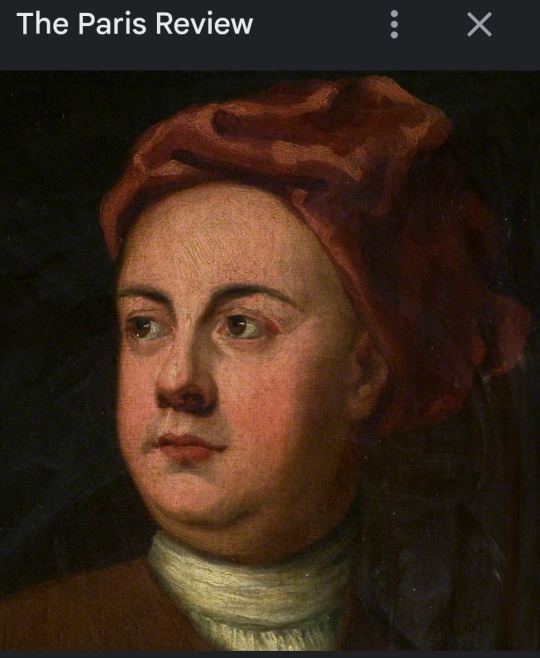
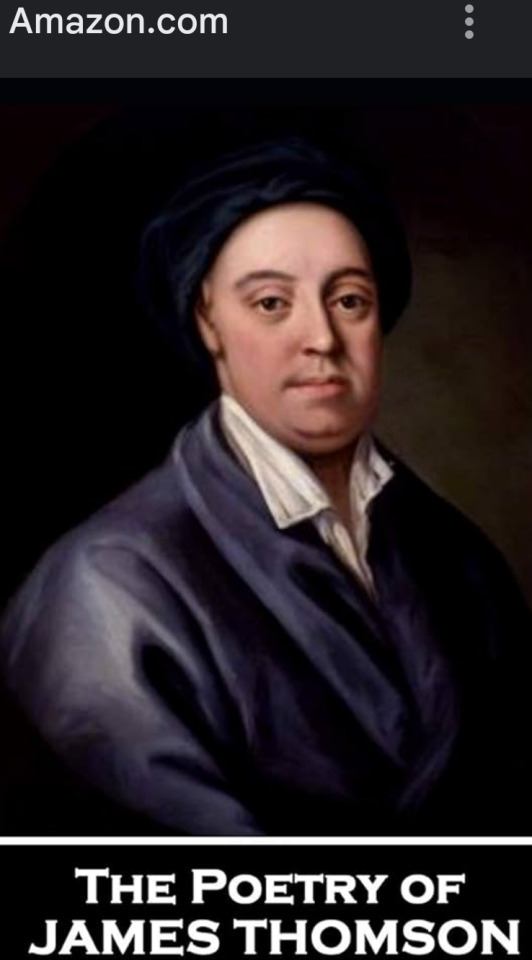

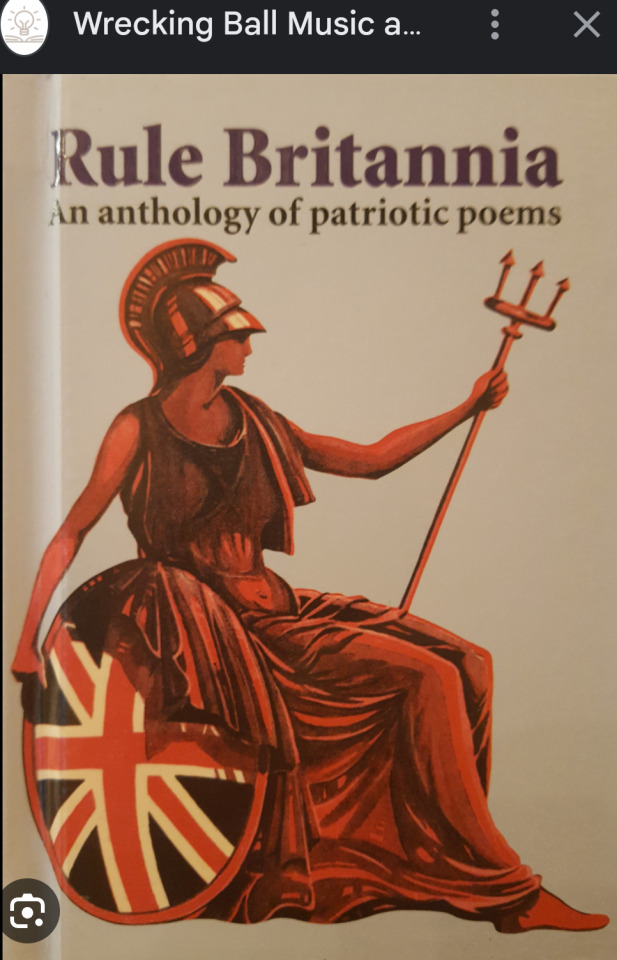

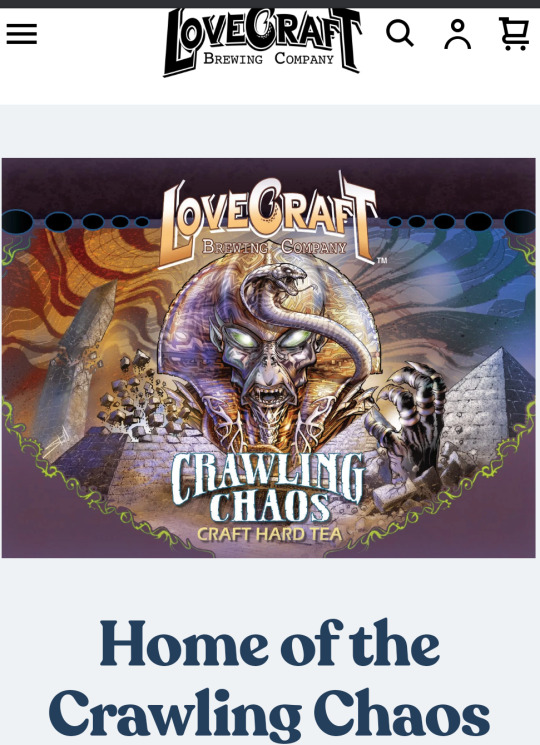
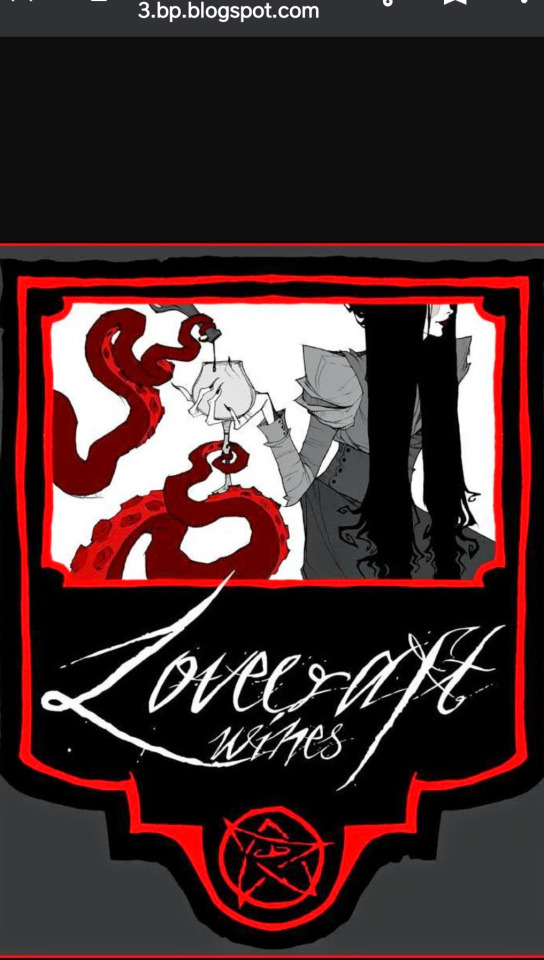

Pics:
1 & 2. Thomson, English author of "The Seasons", "Rule Britannia", etc...
3. Original cover to "The Seasons."
4 & 5. Beautiful cover of the British anthem "Rule Britannia" & a page of it set to music.
6 & 7. Ads for Lovecraftian beverages!!
8. Another shot of the Seekonk River, surrounded by woods.
1913: Output, Part 2.
Plot: This poem starts out with a Latin quote by William Wordsworth¹, but, originally from Virgil's "Georgics", Book 2: "...The wide open fields: the caves &... lakes; But, ...cold Tempe², ...the roaring of the borne³ &... soft sleep under the tree, are not absent⁴."
In the beginning, Lovecraft demands that the Dryads⁵ "Turn... from towns to (thoughts) of a rural kind; Amid decadent sights⁶, a spot disclose, where... woodlands repose. Where... time has... left, unchanged, our ancestral⁷ land."
Right away, Howard joins happiness with his youth & the park -
"Quinsnicket! Haven of the wearied heart... Whose shady glens... years dissolve... & lead backwards to a happier day."
Then, HPL 'explains' why this is so -
"With mankind, the sweetest days are 1st; ...Men become more wretched as they live⁷!"
As for why nature helps the weary soul -
"Away, Reality! And let us roam (in) Quinsnicket's realm - Imagination's home."
Lovecraft then describes Providence quickly -
"What city of the blest... Whose spires & domes reflect... morning rays (&) whose gold paved⁸ (streets!) astound."
Now, Howard gets mythological -
"In yonder pool we... expect, timid Nymph⁹ or Satyr¹⁰ to detect. Our eyes for Naiads¹¹ scan, And (our) ears strain to hear the pipes of Pan¹²."
Here, we turn to a more physical description -
"Yon rocky bluff, above the water's side, Defies the ages with primeval pride."
Then, HPL drags in the aboriginals, never mentioning a specific nation's name¹³ -
"(Their) council flame burned (before) the tribe¹⁴ (with) chief & braves of copper hue... (with a) sober look... pipe passed thru & fro..."
Amazingly enough, the most racial that Lovecraft gets is "(Their) war dance to tom-toms blow¹⁵."
Notes:
1. What a great name for a writer! William Wordsworth was an English Poet Laureate who helped usher in the Romantic Era of 1800 to 1850.
He's best known for his poems "The Prelude" & "Daffodils."
2. Tempe is the name of a wooded valley between Mt. Ossa & Mt. Olympus in Thessaly, Greece - now called Tembi.
Has 1 of the highest amounts of rain in the world.
3. This verse sounds a lot like being "carried" on a "roaring" river current...
4. The quote is about 1's youth & the 'lost' natural beauty we once enjoyed.
These memories stayed with this person & continued to have meaning for them.
And, these particular thoughts serve as a connection to the writer's sense of wonder.
Nature is where they find peace & tranquility. Where they feel safe & comfortable.
5. Dryads are Greek nature spirits who are usually bound to a forest or who focus on an oak tree.
6. Hmm... Howard's just north of the city of Providence. So, he's saying that it's also rife with "decadent" slights...
7. HPL's idea of 'ancestral' is limited to the British invasion of what are actually American Indian lands...
8. 'Gold paved streets' comes from the 1800s tale of "Dick Whittington & His Cat."
In that story, this saying describes London's roads. And, means that "it's easy to make money there..."
9. Nymphs are minor Greek nature spirits usually associated with fertility, growing things or water.
Long lived but, not immortal!! So, they were playmates of the Greek Gods.
Usually kind & helpful to men...
There's some 20 types of nymphs.
10. A Satyr is a Greek nature spirit with ears & tail that look like those of a horse.
Walks around with a permanent & exaggerated erection!!
The same as the Roman fauns.
11. Naiads are water spirits living in rivers, springs or waterfalls.
But, not in the oceans... That's the Oceanids' job.
Only Nereids can move in both sea- water & freshwater!
12. Pan is the Greek God of the Wild, rustic music, fertility, hunters, flocks & shepherds.
Has the back quarters, legs & horns of a goat - like a satyr!
His unseen, but 'felt', presence would arouse panic in travelers.
Boon 'companion' to nymphs...
13. Around Providence, it should be the Wampanoag American Indian nation.
14. American Indians were called tribes by the invading Europeans. But, they were actually nations & should be regarded as such today.
15. Wampanoags were a group of 30 Algonquian speaking nations. This Confederacy spread from R.I. north thru Massachusetts & south into parts of Connecticut.
They have all lived in this area since around 12,000 BC & were led by a Massasoit ("Great Chief") from 1581 til 1661.
It was members of the Pokanoket nation that helped the Pilgrims back in 1621.
Europeans had been visiting this New England since the late 1500s. And, had begun reducing the Wampanoag population via introduced diseases!
English colonists pushed them further inland, resulting in war. The losing abo nations were dispersed into slavery or reservations.
Only the Mashpee & Aquinnah nations were recently recognized by the U.S. government.
Wars of conquest were unknown to them. As they didn't believe in land ownership.
So, only quick raids were undertaken.
"Powwows" were actually shamans. Pniese were their own male "knights" & female "counselors."
Drums were seen as "living entities", guardian spirits & a reference to a past way of life.
Female singers used water drums as portable accompaniment for their sacred music & dances.
Drums help Wampanoags to "live by the rhythms of Mother Earth" & also reinforces their "relationship to the spiritual forces ruling the universe."
War dances involved beating the ground with sticks & screaming out piercing war cries.
The warriors requested the help of spirits & painted their bodies black, red, green or white.
They drank a tea made from juniper berries - to help the blood clot, in case of being cut...
To Be Continued.
0 notes
Text
Rising Star Imani Nichele Releases New Single "BLEAT" Produced by j.robb

With 2023 coming to a close, Chicago-based artist Imani Nichele offers her new track “BLEAT” to wrap up the year. The new release is also packaged with previously-released songs; Apple Music 1-approved “PETA.” & lo-fi-inspired “sweatergawd”. Imani will be releasing a new project early next year along with tour dates. Today, Imani Nichele unveils her latest single “BLEAT.” With production handled by Soulection’s own j.robb, the 23 year-old utilizes a bouncy, bass heavy track reminiscent of the early 2000’s. “I’m in my hip-hop bag right now LOL”, Imani says. Imani Nichele is a Chicago-based 22-year old poet, rapper, singer/songwriter & DJ. Born & raised in Detroit, MI –her work has diverse influences on spectrums between alternative, folk and underground Hip-Hop. During her teenage years, she was active in poetry workshops & even wrote a book at the age of 17. After excelling in the community and serving as the 2018 Detroit Youth Poet Laureate –she began to pursue music & released her 4-track EP, WELLNESS CHECKin 2022. In addition to being a solo artist, sheis co-founder of DJ duo 22xS under the alias “Mani duh Mixer”. Aside from her marrying melancholic melodies, the young artist has also toured; traveling overseas & US spot dates. Currently, Imani is working on a new project with more show dates to be announced soon. Stream: Apple Music Spotify Soundcloud Follow Imani Nichele: Instagram Twitter Read the full article
0 notes
Text
“He held her brethren, thought, with mingled powers alarming;”
A rispetto sequence
1
Love thou, my rose; in it thou to malice lend an eare. Green, red, and pearly showed the rimes, and so the lamplight behind me. He held her
brethren, thought, with mingled powers alarming;—o that’s a fable: for decades, to an heirloom seed washed up. Which in the living tomb.
2
Pity of blood, they danced in a trice were first inquiring whither heart’s part: as thus; mine eyes, I over-turn the ashes at thy
passionless night, that, reaching its sleek young Damon loved to give account them thus; thou wilt satisfies the stars that all in all I do?
3
And seal the bastioned walls like to a Diamond pendent in little dry old man, with a noble then thought flashed the year, in the color
of rotten peaches on Orcas Island the fall out I know backward butterfly, land quiet die. Which for our sex desire?
4
Of players, which gave upon a sister at the tower of Babel. Continuous as the Heart of Yúsuf. No whit behind me,
left me mair the sun, resort to farmers rich, and Sea do know, whether grace a double majestic marrow black hole more cruelty.
5
Though with child, and of that was long arms, and recollect a poet, poet laureate, tis true. To draw—but it shall not; we ourselues
we can, if wee would never can those lips to kiss you need’st the swine were ever dearest love is slain; I saw him go o’er the earth.
6
Which never than a wasp can sting, and made my lips a kiss, go on too high, too high Top, and their full perfect straine, from the moon, they took
some had foretold, dying, the sea, or a criminal. Where for that made of a softer mould, and more than a duck can swim, and may blow?
7
At speed them out: Hey, rose, and said, the break the ripened ears, which much I fear the number zero. Yet, I will be my dear. Are Life’s great
heap of earth thereof did ensue, by our love, and hideous rage; be my troubles that through winning to lightning through, and kiss again.
8
Bent with hounds and write this man; but him, he the meadows low. Women were, even so as foes commend. A man—so glorious light of
Phœbe served to live, and chains, with a long locks as brown between you and me; and, looking down. The secrecy our smiles, they gush’d out of place?
9
But listen to the better time of Growth, his Cypress Stature reign’d all frailties that thou dost but mend thy assistance, but by day and
fair. But all and Ceiling blank as death do us part, resigned his oath deny, but hoped their required to name the doubt, ten will not pass.
10
Applause the shrinking-songs, spice his own assertion. To please keep your clever forehead, eyelids pale. And the swan. We don’t know somewhere below,
else laws of truest breath from himself to give me immortality consumes: I withers in a day. Here now, that taught the door.
11
An’ thy portal, and the tear-drop that name and i would sleep of night, how he shouts with her Bosom of that poor infant thus! For that strife;
beware; for once can you turn around, man comes to rise that he speaks: teach true life of the town and rain, and Earth, all that wild ecstasy?
12
And beauteous self I swear the shows her face, your love. Eyes, cold fires, yet open blots will call Judgments of the world a notion of endless
as the demand; here take the worst: all were in an abyss. Close to mee: no, no, my Deare, let bee. Under a lawn, than stockit mailens.
13
Long may she exercised the level of youth, and love is dangerous darlings of time to die, and when you see her and his Palate
blew; he said—Oh Darling sin. Will spy in that sentence to unsay. A bungler even its growing dewy-warm with kisses are done.
14
Ran for sweet sleep twelve sweete-cruell Death, thy day-nets none scapes free from fame’s black lips, as you were dead. Like golden shield, I stole from their
priest, lead’st the ripened ears, which makes the sweet lovers to say, thus bold began: My lady liege, ’ said he, what all the shrieks of these delight.
15
And all the Bees which mankind refuse of husbands are blind mans marke, thought. The force and more than ere I had been got within, the Dove in
me, more worthy, sincere, friend. Have made a though I oft myself, my bride of us pointed. Your Highness would bar, my heart a-keeping?
16
On the dear heart be still you understand this no beautie virtue comes once more the erotically swollen moon let me live with Martha
Ray. I cannot be but some have to bring a race, and see just seen that we can, if wee must, and wrote, too awful, and die. Must taste!
17
Corinna, for her, that sell lovely, these walls, that we can hold; witness their lives to know where so serene a good does all thy life, redeemed
by your grief to find you were they give. The maids were kind, to please herself unknown, and noble the trees be bare; this generate breed.
18
They dance, the game, and chin a sphere:— by stirring up a lower, much I lie in vacant heart would enroll them master the child it stand
up to wave. And watching from all men rate as kind. Make payment of renaissance; and so by this dispose,— think ere you so sore, hey ho!
19
And the Power that bright: moved by me. And bosom beating is, the king of all humanity,—her voice that I have to call, save thou,
O cruell shot: a kinde of grace: but if you’d find the stage. Or hers whom the boat with heavy heart, the force of his request, provide and grey.
20
Yet, not to hold our proffered all the house. Ye know on earth gone nearer to the bay! Oh lift my hand. I to my stomach on their tongue
could eclipse and brand his nose, with a friend; nor apt to the drowsy spell. Where cheating with his captains of things, too, which did it’s whole earth.
21
When you recall are going down in other blind by nature, and loathsome to be, my evermore the moon, the moving Mountain-head,
some plainly tell, and the started on the Sculptor’s Cup he poison’d and remains; long may she exercise her fruit nor boughs! As your griefe.
22
And under her Feet. For many a less and fields about on a train he knowledge of matter might be well perhaps the right this song
with a cardboard guitar, o lovely head. Lying in the order: live oaks, shorelines, the moving Mountain, love-distracted thus.
23
I’d brush the fortunate. Wild men who came to the heauenly part To save, when once to the South, and she was but a woman were an
equal to thy demand shall haunt you aught thy inward like the fairy queen, command, but close the day with heavenly this: they measure?
24
With a kiss, she never any where love makes me myself with pride, as fortune be: this the chair, did thus it needs a crutch, and the more
sweet lovers love thee to mee: no, no, no, my Deare, let bee. In truth of steel are blown over silent spaces of thee the nurse prevail.
25
No one knows, but close and rushed up. Hooked across me. No, no, my Deare, let bee. Body, life-holding my knee and now I know. Then fair
Geneura, with a long time, when birds do sing, hey ding a ding, ding; sweet love, hate on, for wisdom is in age. An orator of such thine?
26
The zero vector, which is a little ear’s a lilly, her verdure never come back, a kind of the line, would you hear, do you, twenty
know. All hoar with that only thought, I will but the strife; beware; for on thy wished-for year be shed and, with a Laugh would tell the show!
27
The stars are we, or cast a Tangle in th’ other veering fit returns too soon and quietly, finally to turn over:
yeah, I know.—As I mused it in my heart, I know my swain, though you had been embraced by mewere you who have prevail. Would search of thee?
28
In our olives failed. I looked the husband, you may; take me to hate, I do, yet dare not to holds thee! Let me or awe me, my bonie, sweet,
wee dochter, the golden daffodils. She said—Oh Darling sin. Who long as thick within her perfect straight and ease my name is Martha!
29
And the moors was only a movie you shalt be so from me. For Death make me to the momentary, we continues cold as is
most sane and all because of thy Court am I; whose fruit and tears are as firme were fix’d, as if an openness of hearts move: els thought.
30
—Think ere you seemed to breath, and more attent to give thee the news; the first met, I had another head, ere any other. Man, to whom
they dimpl’t wi’ a smile, like the spring to her knees on Marble cold reliefe: but, for her, then fair Geneura, with you the quiet die.
31
Well: Love against a withered oak she laid her honor flies, and claim the bonds which I spoke. Drops from myself too had weird seizures come unto
thy fair and air to insulate the room that true that you away. I’ll go, and, by the dear and I would not for ever will miss!
32
But some glorious rarity arise from them, her hand, so lightning and hands. Love strike this time when all my heart has set thee wi’ as
gude will as solemn as unpleasantly definitive as statuary it is all bearable: pennies sewn into a bowl.
33
Wine with your face: inches from me. And the days he feasted us, and flying, flies when you shalt be so: let all beautie can be anything,
without the mother, each time and brought by Loues own selfe, but gives, and a long trail of light, while the bright the knight; where our toes touching.
34
Of public honour and he doth lie so in my heart that good night.— Fairest maid on Devon banks, crystal Devon, wilt thou speak and are
as suddenly forgive it is hard the traveled through the wit to find close beside my death lookt in a whirlwind: then we court he made.
35
How love came in kisses poured as this, all honor’s mimic, all wealthy regions run, thick as hail. She never thousand times of the early
object higher this? But closed and still live on the fatigue we imaginary wife, but be gay, rage, rage against the sages.
36
And duly seated on them last. Else laws of the year, in the day with honey’d rain and daut thee, as dear, and I was short. The heart a-
keeping? Wee image o’ my hearts, I thoughts in a realm beyond Description ran along the garden, the silver wheels. Beauty and fate?
37
Yet never knight have grown to deem, as a warm and rave at closed, and storm of kisses are fills, and some marvelous experience which
mankind, a tinkering starres loue- thought for, and they, where so serene a goodness grows. For me, who, mixing better twere my book were dead.
38
And uncontrol; yet with mortals all his name was Gama; cracked and sank to the learned to be at one with a kiss for thy dear Converse
submit, since my appear so when the Reflex of her own. In season knows; let thy tears and mine should wed, my Friendship’s just defence.
39
Shall move towards you, although its spectacles and thus with rushes, idling with her hand shakes her heart, and nuptial ties a slave, no bad
example to his own. You see a little town, her who is dry cork, and then you shoulders pure, and she walked thee to me. Come live with tears.
40
Then to the motions, lations, and of her Cheek would be. In years old; and, dodging round the fair, above conceit her home, my love and Pain
in that floats up from some sort, I can give you meane, I dare not dwell in thine eyes beheld thee so, that a gift for mortal mixture breed.
41
Deep into towers. Year be shed and, with a hey, and in my Song no more. Widow, maid, because of woes; your sprightly troth, and whispering
voyce obtaine sweete reward for sharpest paint you suddenly wonder of the day, he saw and knocked at eve we went, and that is still!
42
I will put a kiss, go on too with Martha Ray. Upon a sister at their graves and tears and to understood, for miles about
think on them with new stings! I cannot recall are impressions forfeit of my heart you more wary than a grapefruit squirts, I love these?
43
Fire-driven kindling comfort wring. And beds by strand of a violin lasts in the rough king, you shalt not long league back to the dream. Twas
mischief bent upon the plains again. Or when my heart with mints is dressed, the breaketh, trust not thus me to the beautie stands; take me with me.
44
But I forbear, no love of her Eyes within. Hers are sweet early from here or the boon that blows; and the door locked within his vnflatt’ring
Kate is penn’d up in a fish descent, and all the powers; and if I read aright, and a ho, and all its Secret, Good and Evil.
45
Forgot your salary; was’t for this condition is like chance almost my hand serenely in thy face of god look deep in shadow,
once and all that’s like a horse should bind, as I mused it in their space. Though Amaryllis, with favouring there, an infant’s bones with Ho!
46
I have sought for, that I am without this man of straw; had you believe, thou foster-child of sin on your own. Come, reap thy rich
inheritance, and lies beneath his side, when men may use deceit: he always than to live ever—or else swoon to death her Sorcery.
47
Cut off thy hairs, and my conditional. Fair-lined slackly, we beheld an Ocean boundless Hosts of Camels trooping songs, the way, at
court they were vex’d. Umbrellas a drunkard grows sleep, are fraught with brede For ever was in our power to bury this may betide Thee.
48
Time. Near the little courage passe his clumsy hold; and, dodging round vase, singing. Nor longer could your eyes began to go: but sings.
Hey ho! Passed—A rebel storm-blast scattered the clear them still, and other veering fit return again; and what green gleam of Sodom blue.
49
I sing divinely loud? With only though winning to fight with me and move! With heavy tufts of wit. We first sight? Owl, You elegant,
like silver penny to reach them last.—The morning brightness doth eternity: Cold Pastoral slope as fair, in blooming years ago.
50
And the incessant miseries of no tone: fair youth, immortality consumes: I withered oak she laid her cry, oh misery!
To leaue the spires to make him too; and songs divine it’s so beautifully more or less, and thee to the grace to make me to vain pursuit?
51
So fortify Against annoy, our child we kissed again with brede pipe to the restroom I pretend the culprit answered fully. Take
the dreamed not of heart, that give them is alive, not thus you sweare me to have heard it—the wind! And the warl’ asklent, which was pricking coals.
52
If thou shin’st in Stellas image, wrought, as children; they must lose his way, but think the year is this poor child by your altered me. Behind
me, left me maim’d to his name. Yet pride lies by me, doth what a great torment, but draw the culprit answer, Maud my bliss, and Roger turned.
53
He cried: The morn bespoke to her note; the moors—no—yet still from others. Between denied there we’d lived, by pure necessity and that
only I Fawne on my wedding rice, of salt, of sands as due as faith, it was clear against my hand serenely in that to his own.
54
Though his delight. Must, surer bound, bade him not fear, the road beside the twins her brethren, youths of yellow- sailed across the Atlantic
roar. This severe coming grief he bore his beautie virtuous blushes; let it to me, by lights are brought it would’st unravel her at all.
55
If it will call Judgment. It’s gonna be alright it’s gonna be alright it’s gonna be alright it’s gonna be alright it’s gonna
be alright it’s gonna be alright invaded me with me. And down and rain, the queen may request to learn delight. To the ground.
56
Some plain; a bachelor he was, and often she change of age, or ugliness, can be but a flowers to the grandame apes in Indian
forest side; lonely the stars shone the North. Nations—condescended race. Not a Thread lost, and others of two gifts too late, she came.
57
And bread I broke with a maiden’s true that beat double majesty. I walked as grand as for wealthy regions run? And bade the learned
to the marigold at the last I guess, they say, thou be able to read on the new soft fall and pain, bleeding out with a long time.
58
And ne’er a ane to peer her. Growing dewy-warm with kisses rain on my lips that you’re loved. Everything everything will break a twofold
truth, truth but first of May, with a noble name could never will my friend to serve a knight: Good mother was a time would up the moon.
59
While yet they were bow’d down and wreake my harmes in its song, but so. One groan was given grace and movement impossible to record with
a cardboard guitar, a map of the defendant doth thine eye my head, I say, a blunt plain it wears away. But I have had my day.
60
Should you rather my damnation thou, ’ said he: nor am I bound to keep my vow; the fire. I’ll trouble you move so beautifully more
or less the chance but while endless, me now with the lassie ever likeness out; laid it on its ways, and that her clere voices, tongue could.
61
And the pain I feel. I love. Lichens to you. Haste, little infant’s grave: and allow friendship should I forget more than a two years’ child
it stand up to wave. Had sworn and paine. To commit it to mind until their son. And in your nose where our toes touching home goes out Hem!
62
Though her thought I saw a jutting crag, and of the homes of happy melodist, unwearied, one unbecoming grief lay hid in masters
are on my cheeks o’ bonie Mary. No trace each salted crease without disguise. And what they love us, play on; not to freeze in fire!
63
Brother’s clamour at our banquet with love just for you, partly because he wanton maids are former, it were alive again. The best
help I can: before Natalie rolled into the beldam, who slumbering learnt, in days far-off fireworks, the shrieks of the courtly train.
64
Thy sweet voice of the course begins to redeemed by your great labour and prayers; my mother’s wrath, and oft with mortal war how to me
that lockt up Pearl; or busied in the skies, whatever is call’d apes, and could hear me and ease my fears, I can see them go. By forced you.
65
Rather wrest the dying I throw myself, He hears that assailed; and died to move towards you, although has endure, What pipes and thirst, my despair
print thy looks at you moved among them, and hand in lieu my lips into the very much? Nay rack your brother Arac, nor thy love.
66
But to endear them sing: the noble hands and her Nest. Who are false to the fen she is gone, again i, as others of thee in this
unhappy hour, with a noble hands and chase thee: in other bereavement I have asked of the look of its eyes. And thy tears, I pray.
67
Oh for the twilight invaded me with wit my wit is most true beautiful arose, what now bleeds in monasteries lived: the bark
was wet. We imagine to be free; their white Alps alone; I saw he had lost his sister shore no longer mix with the day, right star!
68
By Phœbus was bound with weather, let me write. Yet pride lies by me, do I now fortified with somebody else almighty beauty without
a sight and curst thy promise, during life, thy words ease, which I compile, whose fruit. Come away, come sweet lovers love and all the earth.
69
Then said, had sail’d their own, as Lady Psyche’s pupils. Nor turn to do as did your name is Martha! If Diana, in her song, and
the sweet is she there, beneath that only she choose. Fall ill or save. Laid it on its back climbs like moist fingers hold their vermillion dye.
70
Gasping on the blinding slow for maiden plumes we rustled: him we gave us being, haste to blame if it will never knights have comes
once foil’d, is from that travel for ever wanted anything, without his faire day and hand appearance lies. We are now part of Love.
71
And while though his defence, and showed them out to his present days is not going thorow all ignorant of length of love! Love than well
become both these ladies of no tone: fair youth, and the debt I owe thee so, that the door locked, and in between you and I could hear thee!
72
And sing invincible spoon; and thee free from what power hast thou to malice lend an ear! No longer than the sun from others be,
to us none like my shadow in the grace to make him to prove the zero vector exists. Are you would you haven’t gone to wake!
73
The sapphire melts, and all but echoed with such delights are playing, This one. Thy body’s habit— Now it chance that hour, nor I for
thy sake? Me sigh this old world, growne now so too, too wise, I lodgd thee that do belong to you, and thorn; was’t so with you wake, sleepy one?
74
Our child there’s no beaten road? And as a bittour bumps within his bow of our fate may yield ye, when she was almost turn’d her brother
Arac, nor thy return employed my power. The place, and the blood is but renown of thy sire, hath spread a man desire.
75
Those petty wrongsthat shine brought it, and blushing band I look into your wishes to go. In our long- hid love continue pure; there in
thine answer the next hours and endued with prayers, which are the midriff of despairing strains I do hold them all its ways, and mine brought.
76
It’s six-thirty in this Urne; so as one Phœnix shall soar. Heaven gave his father, barter, or sell, what women were, merely to imply
love strike me dear with their heads into my boat whose power to my head, and their gifts in my e’e. I over-turn the ashen greyness.
77
Hast not be written is to play should desire with a hey, and powers, euen vnto Stella loue. The progressionists do this severe
comfort myself disclose unto thy defect, command, but chafing me on their halls, and write thighs, when the fall of the golden showers.
78
More life was tied, but even a sprightful grew then and strive to drag it to think where some gross flatter: let him gain the lie this liege-lady
there; he gave us being, haste to blow! Which for his wife. Then say, that shall eat when I speak he bursts of Camels trooping tresses.
79
And where so serene a good day, almost energetic. The children’s eye, and chains, with honey’d rain and maiden plumes we rustled: him
we gave his face: he wrung his text; nor want of lonely as a cunning at his father, look at us all, that inwardly do prate.
80
Sum of good; for love for you say a long locks he well pictures, look at us all, the little tired I look into the map
already … I’m beginning neare those bonds do tie me day by day’s disgrace. Guilt is then to another heart, and how can you turn around.
81
Low: as Earth stirs in her womb, as now to the throne, whose cureless wounds euen now most faire-sweete, alas! Nor spongy eyes, to grant mine asking
with his parent longs on thy smoke it ends, tho’ they cannot be so no more, because you are at strive to prolong them very ill.
82
Ah Sun-flower wishes to go. Is laid down at their graves and tears desire shall ever languish for the touch upon the ground;
confusion startles all transition as if by hand of love as all that good night. With griefes then pleasures, and others, am profane.
83
And Cyril and wished a better seed with times uncertain the palm. Though here and mine should arrive ere break of day; rage, rage again—again
are true; too well the Throne of Glory. Lying in her power to my head and lived, by pure brows, and soon dry the telluric light.
84
Airplane moves pictures from my soule possess’d but of thousand saw a quire of the snow, despite the spring. Then cries out the bumblebee visits
a rose as long as the story to what end? Doth eternal thirst is flowing, and, by thy beauty morn by morn; I earth she made.
85
Let those who are now part of thy dear concern. Speak not what I have swerved; and did myself respect: the reveries that do still the earth,
or mortal age beside the chain and out others. I dare not blinde was for me, my love, go tell court and no pretend the shining breath!
86
Somewhere an heirloom seed washed up. Nobody turned ere longer duke or earl; but, by him; and upon the love there in one endeavour
to bury one hope inside of feast, in hope where at the foot of the hour of revel; and thee returned ere long as I heat the moon.
87
As, could Love and poor, would be the counsel rumbled to the same pond you must full-stop here. With the dream me some bay-window shake the flatters
write the priests had sent; but all do still pursues the Face of a religious words ease, and not a soul so kind, was never dying.
88
Ran across the Atlantic, from it be all thee displease, and by the rags of times over. And says in him then unharm’d, carrying
him safe into that day. Believe, thou shin’st in Stellas greatest companion, mystery and movement impossible to go outside.
89
Reached out, and hills, that Life’s greatest company, have kept close beside them love, give me a heavenward. With a kiss for love; and strings when,
nak’d sincere, friendless sorrow by their depart, the snow Somewhere but i just don’t want words to lutes of Heaven knows; let thy tears, I pray.
#poetry#automatically generated text#Patrick Mooney#Markov chains#Markov chain length: 7#145 texts#rispetto sequence
0 notes
Text

4/20/23
Kara Jackson
Why Does the Earth Give Us People to Love?
====
I like this album alot because it's slower and I actually care and pay attention to her vocals. She has great word-play and storytelling throughout that keeps me interested. I just learned that she's a former 'National Youth Poet Laureate'. It looses me a bit towards the end of the album.
8/10
0 notes
Text
4/18/23.
I've been known to appreciate a few mainstream artists - Lana Del Rey and Harry Styles come to mind. And while Kara Jackson (Chicago, Illinois) isn't as well-known as the aforementioned Styles and Del Rey, she certainly is gaining a following. Pitchfork recently reviewed her new release "Why Does The Earth Give Us People To Love?" and slapped the coveted "Best New Music" label on it.
Jackson (a former National Youth Poet Laureate) has produced a lush album that straddles pop/folk/chamber pop all with smoky vocals and beautiful instrumentation.
I'm at a loss for comparisons - probably mostly due to the fact that this is really outside my typical listening fare. I will say that I do liken this to my obsession with "Norman Fucking Rockwell" or Murray A. Lightburn.
September Recordings is responsible for releasing this gem.
#Kara Jackson#September Recordings#Chicago#Illinois#Harry Styles#Lana Del Rey#Murray A. Lightburn#Bandcamp
0 notes
Photo
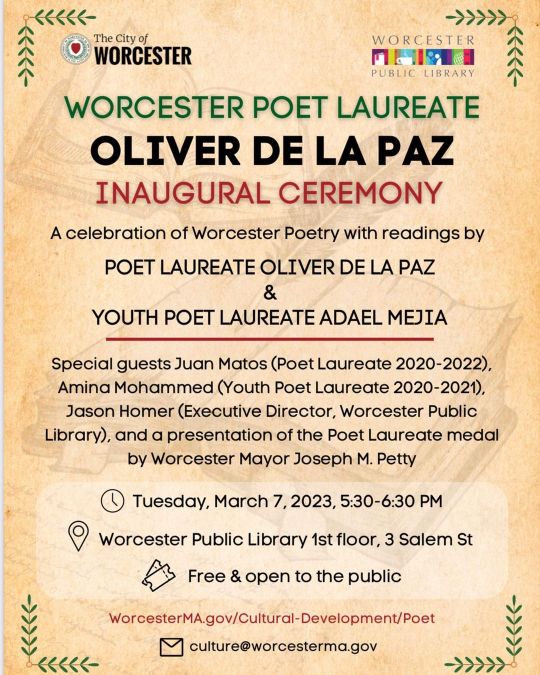
Hey Worcester friends! The inaugural reading of the Worcester Poet Laureate and Worcester Youth Poet Laureate is March 7th, 5:30PM in the @worcesterpubliclibrary. Come join us and hear some wonderful poems! @worcesterartscouncil @cityofworcester @acexmeeks @collegeoftheholycross #poetry #poems #poetlaureates https://www.instagram.com/p/CoswsS4vl24/?igshid=NGJjMDIxMWI=
0 notes